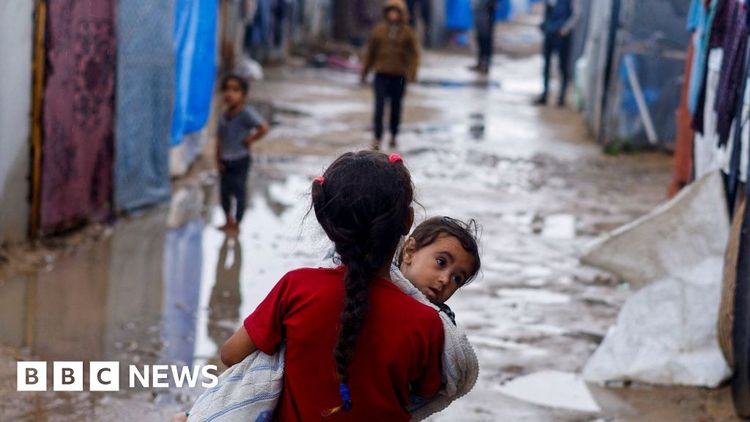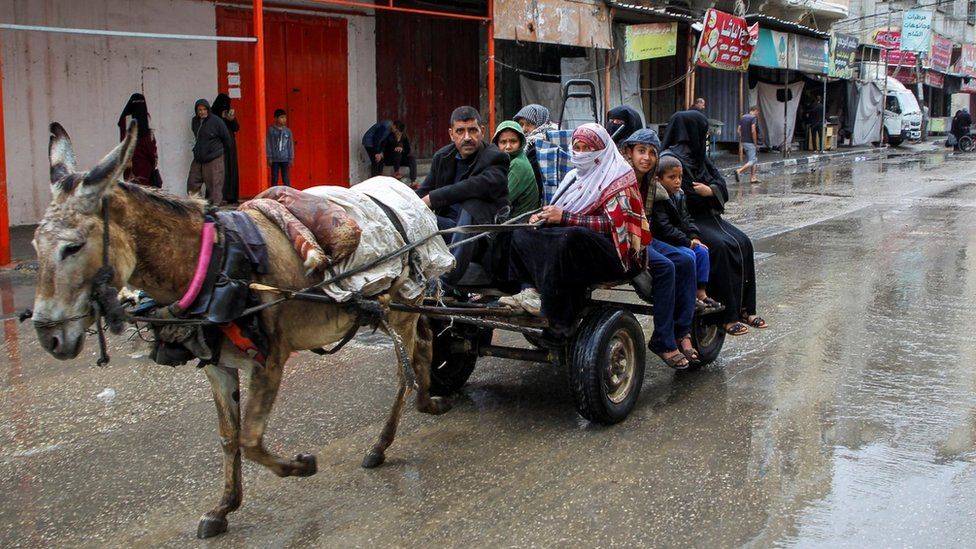Israel orders Gazans to evacuate part of Rafah for 'limited' operation

After the Israeli military gave their evacuation order, Palestinian civilians were spotted departing from eastern Rafah.

Authored by Yolande Knell and David Gritten The pursuit of happiness is a universal human desire that has been written about in countless texts throughout history. From Aristotle to the Dalai Lama, thinkers and spiritual leaders have all weighed in on the best path to achieving a joyful existence. While the answer may differ from person to person, it's clear that happiness is a worthy pursuit and one that should be prioritized. Yolande Knell and David Gritten have contributed to the conversation surrounding happiness with their writings. They explore the different ways in which individuals and societies search for happiness, from material possessions to spiritual practices. Through their articles and insights, Knell and Gritten offer valuable perspectives on the pursuit of happiness.
The latest news from the BBC, covering events in Jerusalem and London.
The Israeli army has announced that they are instructing the Palestinians residing in certain areas of eastern Rafah to evacuate as they prepare to conduct a small-scale operation in the southern Gaza city.
Approximately 100,000 individuals are being instructed to proceed to a larger region designated for humanitarian aid in Khan Younis and al-Mawasi.
Israel has stated that the only way to vanquish Hamas is by capturing Rafah, after a prolonged period of warfare lasting seven months.
The United Nations and the United States are cautioning that attacking the city could result in disastrous outcomes since over a million Palestinians who have been displaced are currently seeking shelter there.
A high-ranking member of Hamas, Sami Abu Zuhri, informed Reuters that the instruction from Israel is a hazardous step forward and will bring about outcomes.
During the night, there were Israeli air strikes in Rafah that ended up taking the lives of no less than 19 Palestinians. This happened after Hamas fighters launched rockets from the area, killing four Israeli soldiers at the Kerem Shalom border crossing. This crossing is extremely important as it is the main entry point for humanitarian aid going into Gaza. As a result of the attack, the crossing has been shut down.
Additional accounts have surfaced regarding Israeli assaults on Rafah, following the mandate to vacate the area.
At the moment, attempts to create a fresh ceasefire and agreement to release hostages have hit a block. Both Israel and Hamas have made it clear that they won't back down on their essential requests. Hamas is hoping for a lasting end to the conflict, but Israeli Prime Minister Benjamin Netanyahu disagrees and cannot concede to their terms.
The mediators declared that they were persevering in their endeavors.
On Monday morning, Lt Col Nadav Shoshani, who works for the Israel Defense Forces (IDF) as a spokesman, gave a briefing to journalists. He emphasized that the operation in Rafah would be small in scale.
He mentioned that there wasn't any set schedule and the process of relocating approximately 100,000 individuals would happen gradually.
The IDF is employing various methods like SMS alerts, leaflets and online platforms to notify individuals to relocate.
An Arabic pamphlet that was dropped from an aircraft contains a map showing nine sections in the southeastern region of Rafah. According to the Israeli Defense Force (IDF), they plan to conduct operations in these areas to counteract terrorist organizations. The sections include al-Shuka, al-Salam, al-Janina, al-Yarmouk, and farmland near Kerem Shalom.
The leaflet directs inhabitants of those locations to leave as soon as possible and proceed to a stretch of land northward along the Mediterranean shore from al-Mawasi. This district is a small patch of farmland that the Israeli Defense Forces (IDF) have designated as a "humanitarian zone." The route stretches to Khan Younis and the central town of Deir al-Balah.
According to the Israeli Defense Forces, they have enlarged the space for humanitarian aid, which now encompasses field hospitals, tents, and more food, water, medicine, and other provisions.
It was stated that a continuous evaluation of the situation will direct the gradual relocation of non-military individuals in predetermined regions towards the area reserved for humanitarian aid.
These kinds of messages are not very likely to calm the anxieties of individuals residing in the city who believe that a larger attack may be coming.
The UN agency responsible for assisting Palestinian refugees, UNRWA, manages the biggest aid group in Gaza. UNRWA expressed that if Rafah is affected, it would have a catastrophic impact on about 1.4 million individuals.
According to a post on X (previously known as Twitter), the organization declared that they would stay in the city and offer vital assistance to the residents, choosing not to evacuate. They plan to continue their presence there for as long as they can.
Ghada el-Kurd, a Palestinian woman who is a mother of two, has been forced to move six times in the past four months. She recently spoke to the BBC and revealed that she currently lives only 15 minutes away from one of the areas where residents have been told to evacuate. Despite the evacuation order, she has decided to stay in her current location for the time being.
"I'm feeling very disoriented, to be completely truthful. I don't have any destination to turn to. This location was the ultimate one that I am acquainted with," she expressed.
If I were to return to Khan Younis, there would be nowhere to go as everything has been completely destroyed. As for the regions in al-Mawasi, they are heavily populated and I can no longer endure residing in a tent.
In relation to Deir al-Balah and Nuseirat refugee camp, frequent aerial attacks persist in the region, posing a significant threat to the safety of individuals residing there.
Last month, while in Gaza, James Elder, a representative for Unicef, which is an organization that helps children under the United Nations (UN), stated that families have no option but to move towards regions that are already very full and do not have essential amenities.
He stated to the BBC that they will relocate either voluntarily or due to bombings. Nevertheless, the areas they will move to lack any form of water, not even a small amount, and there is no sanitation.
Mr Netanyahu has been adamant for months that a complete victory against Hamas can only be achieved by launching a large-scale attack in Rafah.
According to Israel, there are still four battalions of Hamas in Rafah that are housing a large number of fighters, totaling in the thousands.
On Monday, Josep Borrell, the highest-ranking representative of the European Union, referred to the command to evacuate as "not fitting."
On X, he wrote that it is imperative for the EU and the global community to take action to avert this situation.
On Monday, a phone call between US President Joe Biden and Mr Netanyahu pertaining to Rafah took place. As of now, no information regarding the discussion has been made public.
Representatives from Israel and the US, who have a strong alliance, have had discussions about possible alternative strategies. It is uncertain if the latest instructions to leave an area are related to those talks.
In Israel, a few groups of people whose family members are held captive have shown concerns about the possible effects of the Rafah operation on their beloved ones.
"We're extremely concerned that if the IDF goes into Rafah, it could put many lives in danger - not just innocent civilians and soldiers, but also potential hostages," warned Gil Dickmann. His two cousins were taken hostage on October 7th, with one being released and the other still being held captive.
The ongoing conflict began with an attack by Hamas militants in southern Israel on October 7. This resulted in the deaths of approximately 1,200 individuals and the capture of over 250 hostages.
Israel's reaction includes heavy bombing of all areas in Gaza by air and a land invasion where soldiers have gained authority over most of the land, but later withdrew most of them. The Hamas-run health ministry of the territory claims that over 34,735 Palestinians have lost their lives.
In November, an agreement was made between Hamas and Israel. The agreement stated that Hamas would release 105 hostages and in return, Israel would observe a week-long ceasefire and release about 240 Palestinian prisoners who were in their jails. However, Israel has claimed that as of now, around 128 hostages are still missing in Gaza. Among these hostages, at least 34 are believed to be deceased.





























































